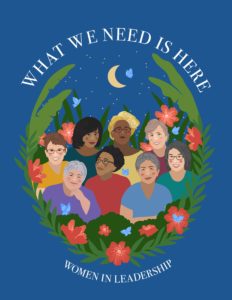
Abby Endashaw
Photo by: Lancaster Global Shapers
Abby Endashaw shares how our uncertainty because of the many fears we face today can be quelled by offering ourselves compassion, as an access point to God.
Abby Endashaw works for Mennonite Central Committee as the summer service national coordinator, a grant program for young adults of color that approaches leadership development through the lenses of service and justice. Before joining MCC, she earned a Bachelor of Arts in psychology and Master of Arts in professional counseling. She, then, went on to become a Licensed Professional Counseling Associate in the state of Texas, where she served women and children survivors of trauma. Abby and her cats, Drea and Penny, live in Dallas, Texas, the ancestral lands of the Wichita, Tawakoni, Kickapoo and Jumanos Indigenous Peoples. Abby serves on the MC USA Women in Leadership Steering committee.
__________________
Have you ever wondered what therapists talk about when they get together?
Over the past two years, one of the most frequent questions I have heard therapists ask has been, “How can we better support our clients who are suffering from fear, anxiety and hopelessness as a result of the political climate?” The context from which these questions are asked is as variable as they are relatable: an activist experiencing burnout following months of organizing for a ceasefire in the Gaza strip, a midwife in existential crisis as she supports a teen in a state that has outlawed abortions, a parent whose anxiety skyrockets as she watches her transgender child board the school bus, and most recently, a child watching ICE (U.S. Immigration and Customs Enforcement) trucks driving by their school from their classroom windows. Fear is a regular part of our existence in this time.
Over these past few weeks, I found myself revisiting Howard Thurman’s “Jesus and the Disinherited.” I have found myself especially struck by the sections in which he writes about the multiplicity of fears at play in our world. There are fears we all share: fear of rejection, the future, poverty, sickness and loss. There are also fears that emerge from a world that the powerful have organized into profoundly unjust, yet dominant, cultural systems. This is a world in which the disinherited live with a unique fear that is also a self-protecting wisdom that has been trained and fortified in us from an early age while watching the news, listening to our elders, and through all our own experiences. It tells us: “We are not safe,” or “They will not protect us,” or “I am not a person who matters here.”
While this fear protects us from very real dangers in our society, it can also become a mental strait jacket. Thurman says, “fear, which served originally as a safety device, a kind of protective mechanism for the weak, finally becomes death for the self. The power that saves turns executioner. … In the absence of all hope ambition dies, and the very self is weakened, corroded.”
Can you recognize even a small part of yourself in these fears? Or perhaps, you have noticed your fear now devolve into what Thurman calls fear’s “twin sons of thunder—panic and despair.” You may notice it in a passing thought, one that you hesitate to utter aloud. It whispers, “There is no hope,” as it commands you to numb yourself against the world ablaze around you. Or have you noticed the quickening of your thoughts? Is your inner world moving more quickly or more loudly than before? Maybe you find yourself glued to your phone, refreshing the page, searching for answers. Perhaps there is something within you that is desperate for someone who has an answer for today’s tragedies. It extends its gaze outward, looking for someone, anyone, to an anchor its hope upon.
If you recognize yourself in these words, a part of you might cringe with vulnerability or some kind of self judgement. It can be uncomfortable to witness ourselves in this way. Suspend the urge to criticize or shame yourself for just one moment. Take a breath; allow your judging thoughts a moment to settle. When you are ready, turn your gaze inward and ask yourself the following questions:
- What does this fear feel like? Notice how it animates your physical body.
- Is it hot or cold? Is it targeted and sharp? Or is it broad and heavy?
- What means has this fear used to make itself known in your life? Has it slowed you down? Has it made you speed all the way up?
- Does this fear have an origin story? What does it really want you to know?
As a child in a charismatic church, I learned to feel the physical movement of the Spirit. I can only describe it as an awareness that the Great Unknown was nearby. Sometimes I experience this sensation when sitting across from a client in a therapy session. Rob Bell in “What We Talk About When We Talk About God” describes this sensation as when the veil between the natural and spiritual realms thins. As a young therapist, I didn’t have words for what was happening. I was not doing anything; it was just happening. Now, I understand better.
Compassion, in its purest form, is one of the most powerful ways we experience the Creator’s presence. When we stand face to face with our fear, our panic and our anxiety, and offer those bottled-up parts of ourselves compassion, we are surrendering ourselves to experiencing God.
Compassion is an access point to God within and in all.
Compassion is not the only access point we use to connect with the Divine. The founder of a therapy model called Internal Family Systems, which I trained in last year, Dick Schwartz, calls them the 8 C’s and 5 P’s:
Compassion
Curiosity
Clarity
Connectedness
Calm
Creativity
Presence
Playfulness
Perspective
Patience
Persistence
Have you experienced this thinning between the spiritual and natural realms, as you repair a relationship with a friend or coworker? It is a natural result of accessing the curiosity, compassion and perspective within. I have noticed this thinning when marching in Black Lives Matter or Free Palestine protests, overwhelmed by a feeling of connectedness with those around me. Worship is a form of creativity. Nature helps us gain clarity, calm and a sense of connectedness with creation and God. Connectedness, clarity and courage can be found when we unite with others, with a shared purpose, clear vision and commit to action.
This February, in a time when there is so much uncertainty and fear, my challenge to you is to envelope your fear with as much of this self-energy as you can welcome. On days when it is hard to feel anything other than fear and its sons of thunder, reach for the Spirit. In that space, where calm, courage and clarity reside, perhaps, we will begin to feel connected to the Great Unknown, the God Who Sees, and can follow the Spirit’s promptings on where to go next.

MC USA’s Women in Leadership is hosting a one-day Women’s Summit, “Beholding it Together,” July 8, immediately preceding the Follow Jesus ’25 convention, in Greensboro, North Carolina. Register today! https://convention.mennoniteusa.org/registration/

MC USA’s Women in Leadership (WIL) works to dismantle patriarchal systems in Mennonite Church USA by empowering women to live out the call of God on their lives, increase their capacities, and contribute their wisdom in congregations, area conferences, agencies and institutions.
Support Women in Leadership here.
The views and opinions expressed in this blog belong to the author and are not intended to represent the views of the MC USA Executive Board or staff.

